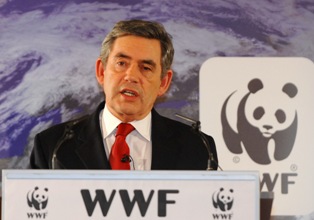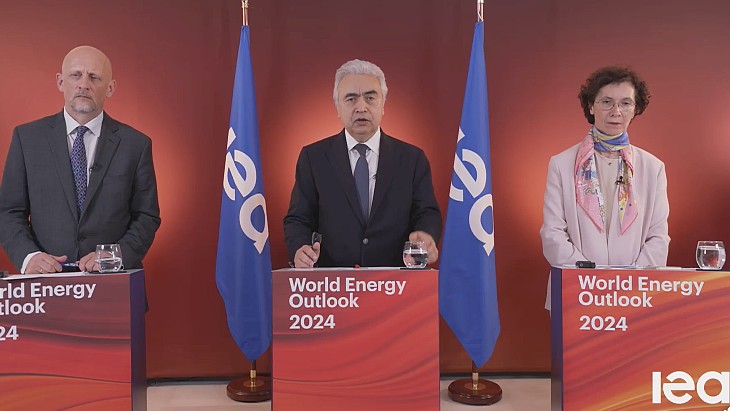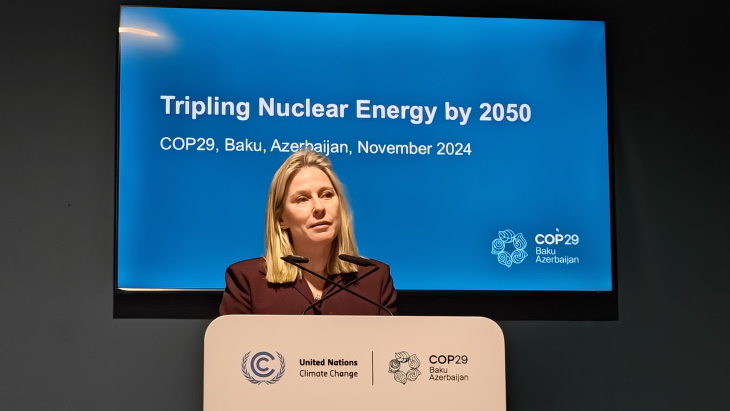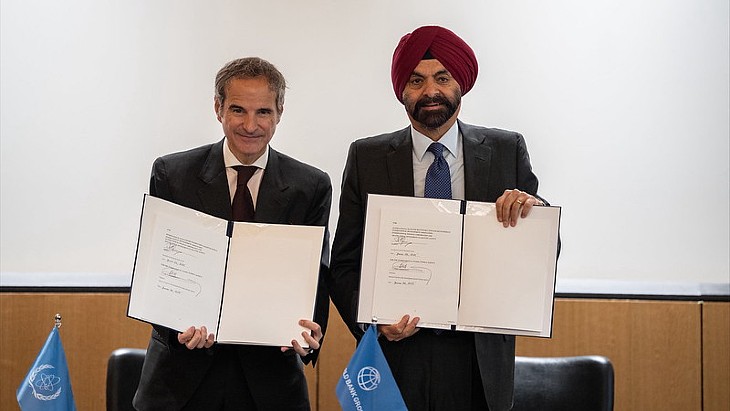Brown goes green
Tuesday, 20 November 2007
 Speaking at a WWF seminar on 19 November, Brown set out a number of measures his government is planning to cut carbon emissions. Brown said it was an imperative to have a "major drive to decarbonise our energy sources." One part of that, "potentially," could be new nuclear power, said Brown
Speaking at a WWF seminar on 19 November, Brown set out a number of measures his government is planning to cut carbon emissions. Brown said it was an imperative to have a "major drive to decarbonise our energy sources." One part of that, "potentially," could be new nuclear power, said Brown
Brown said an announcement based on the nuclear consultation would come next year, rather than immediately before the Christmas break as previously thought. Until the consultation response is made, ministers must be careful to surround references to nuclear power with caveats.
Hosts of the meeting, WWF, notably withdrew from the nuclear consultation along with several other green groups, saying it was flawed. However, a statement from the group coinciding with Brown's speech pandered to him by not challenging his words.
Besides considering new nuclear, other supply-side initiatives Brown spoke about were a GBP1 billion ($2 billion) investment in renewables, and that carbon capture and storage could be made mandatory for UK fossil-fuelled power stations if it proves technically and commercially viable. Subsidy from the Renewables Obligation is to be made available to tidal lagoons and barrages of below 1 GWe capacity.
At present, nuclear is the UK's largest source of low-carbon energy, supplying 7.5%. All renewables currently total 2%, but this is proposed to triple by 2015. One notable renewable project is the 8600 MWe Severn Barrage, which could generate 5% of UK electricity. It is currently at the feasibility study phase.
All these potential initiatives would form part of a medium-term plan based on a climate change bill due sometime next year. It would place caps on emissions with five-year "carbon budgets" set by an independent committee. International caps and carbon markets are seen as being the best way to facilitate a global market-driven change to low-carbon ways of life.
Brown plans a consultation next year to identify ways to achieve his targets.
UK prime minister Gordon Brown has told environmental campaigners he wants virtually all energy for electricity and heat to come from low-carbon sources by 2050. New nuclear is a possibility, as is making carbon capture compulsory.
UK prime minister Gordon Brown has told environmental campaigners he wants virtually all energy for electricity and heat to come from low-carbon sources by 2050. New nuclear is a possibility, as is making carbon capture compulsory.  Speaking at a WWF seminar on 19 November, Brown set out a number of measures his government is planning to cut carbon emissions. Brown said it was an imperative to have a "major drive to decarbonise our energy sources." One part of that, "potentially," could be new nuclear power, said Brown
Speaking at a WWF seminar on 19 November, Brown set out a number of measures his government is planning to cut carbon emissions. Brown said it was an imperative to have a "major drive to decarbonise our energy sources." One part of that, "potentially," could be new nuclear power, said BrownBrown said an announcement based on the nuclear consultation would come next year, rather than immediately before the Christmas break as previously thought. Until the consultation response is made, ministers must be careful to surround references to nuclear power with caveats.
Hosts of the meeting, WWF, notably withdrew from the nuclear consultation along with several other green groups, saying it was flawed. However, a statement from the group coinciding with Brown's speech pandered to him by not challenging his words.
Besides considering new nuclear, other supply-side initiatives Brown spoke about were a GBP1 billion ($2 billion) investment in renewables, and that carbon capture and storage could be made mandatory for UK fossil-fuelled power stations if it proves technically and commercially viable. Subsidy from the Renewables Obligation is to be made available to tidal lagoons and barrages of below 1 GWe capacity.
At present, nuclear is the UK's largest source of low-carbon energy, supplying 7.5%. All renewables currently total 2%, but this is proposed to triple by 2015. One notable renewable project is the 8600 MWe Severn Barrage, which could generate 5% of UK electricity. It is currently at the feasibility study phase.
All these potential initiatives would form part of a medium-term plan based on a climate change bill due sometime next year. It would place caps on emissions with five-year "carbon budgets" set by an independent committee. International caps and carbon markets are seen as being the best way to facilitate a global market-driven change to low-carbon ways of life.
Brown plans a consultation next year to identify ways to achieve his targets.
Most Read

Scale of microplastics in Antarctic revealed in preliminary survey results
Wednesday, 18 September 2024
_99697.jpg)
Nuclear becomes eligible for hydrogen tax credits under updated US rules
Monday, 6 January 2025

IEA forecasts continued nuclear capacity growth to 2050
Wednesday, 16 October 2024

More countries sign declaration to triple nuclear capacity
Wednesday, 13 November 2024
Podcasts & Features
Viewpoint: Strategic coalitions in nuclear business
Podcasts & Features Tuesday, 8 July 2025
Podcast: The World Bank ends ban on nuclear energy funding
Podcasts & Features Saturday, 28 June 2025

Related Links
Related Stories




..._58412.jpg)

